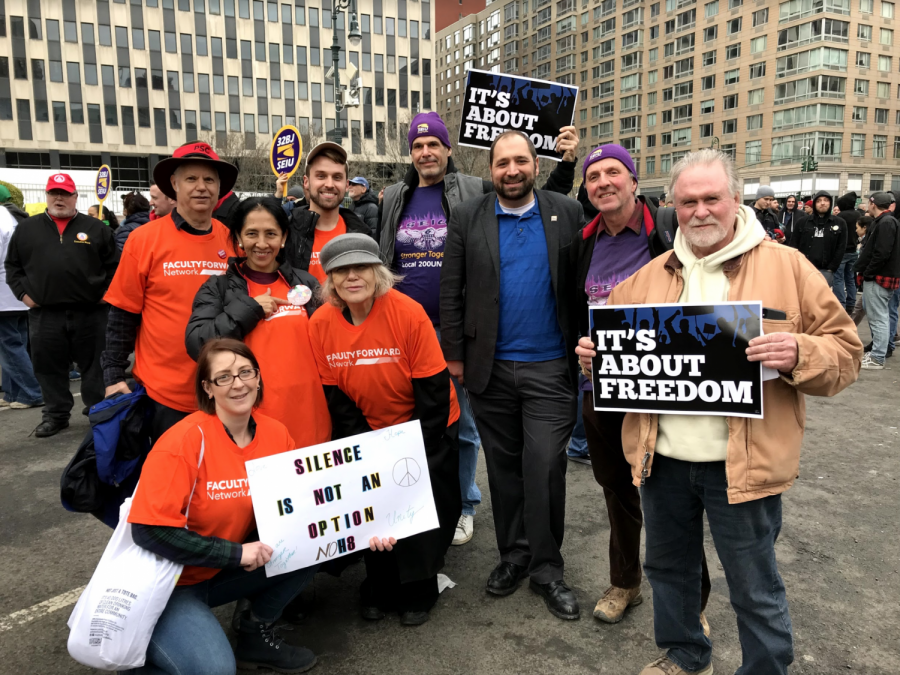Fordham Faculty Fights for Fair Pay
The story of the largest activist group on Fordham’s campus: its faculty
COURTESY OF FORDHAM FACULTY UNITED
Fordham Faculty United members protesting at an event at the height of tensions during their campaign in April 2017.
September 18, 2019
On Aug. 28, 2019, every professor instructing a class at Fordham University knew exactly what their salary was going to be for the upcoming academic year. This wasn’t the case just two years ago.
On Aug. 28, 2019, every professor instructing a class at Fordham University knew exactly what their pay was going to be for the upcoming academic year. This wasn’t the case just two years ago.
Many students at Fordham have kept up with the vast array of activism campaigns led by students on campus; however few are aware of one of the largest activist campaigns in Fordham’s history taking place right now. Since 2016, roughly half of Fordham’s faculty has been fighting for higher pay, better benefits and more job security.
“Our working conditions are the students’ learning conditions,” said Professor Joshua Jordan, an advanced lecturer in the department of modern languages and literature.
In 2017, Jordan and Professor Katherine Wilson, an adjunct lecturer in the English department, began serving as co-chairs of Fordham Faculty United (FFU), a labor union representing those within Fordham’s contingent faculty seeking more benefits from their positions at the university.
The two co-chairs were both part-time adjunct professors when they began the campaign. Almost all professors involved had little to no experience with union organization beforehand.
“Most of us are new to this kind of thing,” said Wilson. “In my case, I come from other kinds of activism, but it wasn’t labor.”
They, along with a handful of other faculty leaders on campus, established the all-volunteer organization FFU. They operate under the guidance of the worldwide Service Employees International Union (SEIU), which has also worked with Fordham’s security staff for a number of years.
Murmurs of unionizing Fordham faculty had circulated for years, but the galvanizing push occurred in April of 2017. After several weeks of unsuccessful negotiations as an unofficial union, FFU leaders filed for legal action and, with the larger faculty Senate, issued a vote of no confidence in University President Father Joseph M. McShane, S.J.
Tensions between faculty and administration were eased, however, when FFU became an official union and began negotiations. It was then, according to FFU’s co-chairs, that the administration changed course and began “sitting across the table — literally” from faculty leaders, said Wilson.
This year, the union hopes to give its members, Fordham’s contingent faculty (professors classified as adjuncts or lecturers) more ability to integrate into the Fordham community. Contingent faculty, who make up nearly two-thirds of Fordham’s professors, often have no office space on the Lincoln Center campus and little input in their academic departments’ decisions.
“A lot of the most recent work we’ve been doing over this last year has been around difficulties that faculty have faced via their departments or administration,” said Jordan. “For the first time now, they have some kind of recourse instead of just having to take things lying down.”
A particularly important victory for the union came last year, when full-time contingent faculty were guaranteed a set yearly salary with raises and the expectation that they’d be invited back to the university to teach for subsequent years. Part-time adjuncts were given both a pay raise and an expectation of being invited back to teach, following a short probationary period.
Just two years ago, part-time faculty were paid just $4,000 by-the-course and had no idea where they would be spending their next semester.
“For a while there, all we had was one semester and a prayer,” said Wilson.
While most of these events occurred before the majority of the current student body arrived on campus, the efforts of FFU have had an unmistakable impact on their University experiences.
“When we went in to the negotiations, we were saying, ‘What do we want, well — we want to teach well,” said Wilson. “So what are the conditions that enable us to teach well? [Many of us were] in an impossible situation, people having no offices, people having to run between five campuses, people not being able to afford rent.”
Yet while these developments were important to their professors, most Fordham students seem to be unaware of the union’s existence.
“I’m not sure how many of my professors have been adjunct versus tenure,” said Daejah Woolery, Fordham College Lincoln Center (FCLC) ’22. “I know about the distinctions vaguely, but not as they specifically apply to Fordham.”
“And I haven’t actually heard about this union,” said Woolery. “But I can’t say I’m surprised. It really just points to how much education is treated as a business first and foremost.”
“There isn’t enough care for students and certainly isn’t enough care for educators,” she said. “Even though I’m just hearing about the fight, I’m happy they won.”
For administration, most of the hesitance around meeting the union’s demands has been about keeping Fordham’s educational costs lower as the price of higher education continues to rise nationally.
“The University is aware of the considerable burden placed on students resulting from the rising costs of higher education,” said Beth Fagin, associate general counsel for Fordham University. “We are mindful of the need for both financial aid and higher pay for non-tenure track professors and try to balance these competing monetary interests.”
In regards to the conversation this year, Fagin said, “The administration and the union have a solid working relationship. We communicate weekly to address issues and work hard to resolve our differences.”
“Honestly, I had no idea about this union, but I think it’s really great that they are being paid a better wage,” said Duncan Taylor, FCLC ’22. “[Adjuncts] work on a similar level as tenured professors. If the majority of faculty are adjuncts, then they should be paid at the level they deserve.”
“The University and the union share the common goal of providing a world class educational environment for our students,” said Fagin. “At times, there may be disagreements over how to achieve this goal, but we have worked collaboratively to find common ground,” she said of the administrative perspective.
“This [has been], for many of us, our first experience of meeting the administration as a community at the same table,” said Jordan. “You had people who are accustomed to a certain precariousness in their working conditions who were at last getting this first glimpse of what union empowerment can mean. And it is sitting — facing the administration, and discussing the future working conditions at Fordham.”
Update Oct. 23, 2019: Fordham Faculty United has released additional information about Fordham’s faculty pay, the union’s membership and its history. The article has been corrected to reflect this new information.













